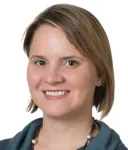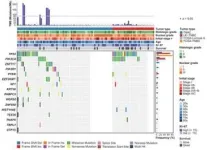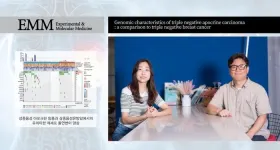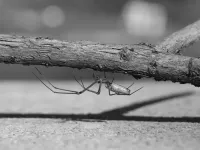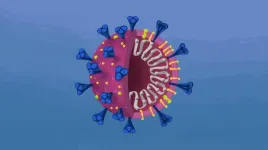(Press-News.org) The University of Chicago will launch a pioneering new center aimed at shifting the popular narrative around the physical and cognitive impacts of aging.
Headed by leading neuroscientist Emily Rogalski, PhD, the new University of Chicago Healthy Aging & Alzheimer's Research Care (HAARC) Center will focus on building deep multidisciplinary expertise and bridging the gap between scientific disciplines to accelerate breakthroughs in cognitive resilience.
“We want to increase awareness and the scientific probability of positive trajectories of aging for all,” said Rogalski, who joined UChicago as a Professor of Neurology in September. “There are people who are living long and living well, and we aim to uncover factors contributing to extended healthspan and avoidance of Alzheimer’s and related diseases.”
Shyam Prabhakaran, MD, the James Nelson and Anna Louise Raymond Professor of Neurology and Chair of the Department of Neurology, pointed out that aging and dementia now top the list of health concerns among Americans surveyed, surpassing even cancer, heart disease and stroke. The new center represents a substantial investment from UChicago to address these concerns with even more resources and expertise.
"Having a focus on these critical areas of aging, Alzheimer’s and other dementias is paramount to us as a department of neurology," he said. It’s especially important as the world’s population continues to age—the WHO estimates that one in six people will be aged 60 years or older by 2030.
Early in her career, Rogalski operationalized the term “SuperAgers” to describe people over the age of 80 whose memory still functions as well as that of someone in their 50s or 60s. Rather than simply focusing on what goes wrong in dementias, she wants to understand what goes right in the brains of SuperAgers. She leads an international team whose research methods encompass a wide range of assessments, from cognitive and motor function tests to neuroimaging and wearable sensors. This deep phenotyping approach aims to understand the intricate factors contributing to healthy brain aging and dementia.
Rogalski has also made significant contributions in the field of Alzheimer’s and related dementias, especially primary progressive aphasia (PPA) where language impairment is the prominent symptom. She has helped pioneer telehealth interventions for individuals affected by these disorders, offering tools to enhance their quality of life and communication skills.
The new UChicago HAARC center will act as a multidisciplinary research hub that brings together neuroscientists, geneticists, clinical neurologists, psychiatrists, neuropathologists, radiologists, data scientists, immunologists and more to seek comprehensive insight into resilience and cognitive preservation.
“Research is better when we do it together,” Rogalski said. “In collaborations, some people are deep specialists while others are go-betweens that bridge disciplines, and we need both. At the center, we want to be those go-betweens — integrating rich expertise in cognition, imaging, and neuroscience with genetics and other key disciplines. We hope to cultivate an environment rooted in synergistic collaborations that lead to planned and serendipitous discoveries: research where the sum is greater than the parts.”
“These kinds of centers leverage the University of Chicago to the max because they can bring together so many experts and ideas in new ways,” Prabhakaran added. “Emily Rogalski is a catalytic leader who can act as a magnet to bring together the partners who will lead to a successful Alzheimer’s and aging center.”
Rogalski’s move to UChicago also brings greater opportunities to involve historically underrepresented populations in dementia research. Rogalski and her collaborators plan to emphasize diversity when designing new investigations and trials, and she says her relationships with experts and community members from the neurology clinic and Memory Center at UChicago Medicine, along with external organizations like the SHARE Network, will be a crucial starting place.
“UChicago has done community engagement right from the beginning, and I’m honored to have the opportunity to help support and grow existing partnerships,” Rogalski said. “I’m excited to work hand in hand with the clinicians, communities, researchers and other stakeholders to conduct research that is genuinely meaningful and beneficial to our community.”
“We hope the Healthy Aging & Alzheimer's Research Care Center will begin an era of unprecedented collaboration that will bring about groundbreaking discoveries that reshape perceptions of aging,” Prabhakaran said.
END
Emily Rogalski joins UChicago to lead new center for healthy brain aging, Alzheimer's and related diseases
2023-09-13
ELSE PRESS RELEASES FROM THIS DATE:
Illuminating the path to sustainable wellbeing
2023-09-13
IIASA is proud to announce the launch of its Flagship Report, "Systems Analysis for Sustainable Wellbeing. 50 Years of IIASA Research, 40 Years After the Brundtland Commission, Contributing to the Post-2030 Global Agenda” on Wednesday, 13 September 2023 at an official UN event in the framework of the 78th session of the UN General Assembly and the Sustainable Development Goals mid-term review.
The IIASA Flagship Report chronicles the extraordinary 50-year journey of IIASA, a globally renowned institute providing systems analytical expertise on complex global challenges. Co-sponsored by the Permanent Missions of Austria and South Africa ...
Study finds that state-mandated civics test policy does not improve youth voter turnout
2023-09-13
Washington, September 13, 2023—The United States has the largest age gap in voter turnout among advanced democracies. Youth voter turnout remained low, at 48 percent, in 2020. Scholars, educators, and policymakers often recommend civic education as a solution to low youth voter turnout.
However, new research finds that a commonly used state-mandated civics test policy—the Civics Education Initiative (CEI)—does not improve youth voter turnout, at least in the short term. The study, by Jilli Jung and Maithreyi Gopalan, both at Pennsylvania State University, was published today in Educational ...
Groundbreaking research unveils genetic characteristics and improved prognosis of triple negative apocrine carcinoma
2023-09-13
Breast cancer research takes a significant stride forward as Professor Semin Lee and his research team from the Department of Biomedical Engineering at UNIST, in collaboration with Professor Ji-Yeon Kim and Professor Young-Hyuck Im from the Division of Hematology-Oncology at Samsung Medical Center in Seoul, delves into the exploration of triple negative apocrine carcinoma. This rare breast cancer subtype has garnered attention due to its unique genetic characteristics and improved prognosis when compared to other forms of triple-negative breast cancer (TNBC).
Triple negative ...
Inflammatory signs for adolescent depression differ between boys and girls
2023-09-13
New research led by the Institute of Psychiatry, Psychology & Neuroscience (IoPPN) at King’s College London has found that depression and the risk of depression are linked to different inflammatory proteins in boys and girls.
When inflammation occurs in the body a host of proteins are released into the blood called cytokines. Previous research has shown that higher levels of cytokines are associated with depression in adults, but little is known about this relationship in adolescence.
Researchers investigated sex-differences in the relationship between inflammatory proteins and depression. Published in the Journal of ...
The effect of crowdsourcing contests on a company's stock and the idiosyncratic risks they create for investors
2023-09-13
Researchers from University of Colorado Denver, Iowa State University, and Arizona State University published a new Journal of Marketing study that examines the stock market effects on these contests and the contest characteristics that may enable such contests to pay off.
The study, forthcoming in the Journal of Marketing, is titled “When Do Marketing Ideation Crowdsourcing Contests Create Shareholder Value? The Effect of Contest Design and Marketing Resource Factors” and is authored by Zixia Cao, Hui Feng, and Michael A. Wiles.
Crowdsourcing contests for marketing ideas such as new ads, graphics, and products have become quite popular ...
Some spiders can transfer mercury contamination to land animals, study shows
2023-09-13
Sitting calmly in their webs, many spiders wait for prey to come to them. Arachnids along lakes and rivers eat aquatic insects, such as dragonflies. But, when these insects live in mercury-contaminated waterways, they can pass the metal along to the spiders that feed on them. Now, researchers reporting in ACS’ Environmental Science & Technology Letters have demonstrated how some shoreline spiders can move mercury contamination from riverbeds up the food chain to land animals.
Most mercury that enters waterways ...
National awards recognize 19 students, schools, and educators’ commitment to health
2023-09-13
DALLAS, September 13, 2023 — On Tuesday, Sept. 12, the American Heart Association, a global force for healthier lives for all, recognized 19 students, schools and educators for their commitment to end cardiovascular disease, the nation’s no. 1 killer, through the Association’s in-school programs, Kids Heart Challenge™ and American Heart Challenge™. The annual National Awards Ceremony, held virtually, was joined by program participants from coast to coast and ...
American Society for Microbiology announces ‘gain of function’ recommendations from top scientists
2023-09-13
Washington, D.C. — Sept. 13, 2023 — The American Society for Microbiology today released consensus recommendations from a workshop of leading scientists who reviewed the benefits and risks of “gain of function” research, as well as related policies and procedures, and proposed a foundation to guide discussions and improve oversight moving forward.
The recommendations – together with a call to action for the scientific community and the general public – are intended to inform assessments of “gain of function research of concern,” which makes up a small fraction of all biological research. ...
Scientists uncover COVID’s weakness
2023-09-13
New UC Riverside research has revealed COVID’s Achilles heel — its dependence on key human proteins for its replication — which can be used to prevent the virus from making people sick.
In a new paper published in the journal Viruses, the UCR research team describes an important discovery. The protein in COVID that enables the virus to make copies of itself, called N, requires the help of human cells to perform its job.
Genetic instructions in our cells are transcribed from DNA to messenger ...
UMass Amherst and Embr Labs develop ‘digital drug’ to predict hot flashes
2023-09-13
Researchers at the University of Massachusetts Amherst’s Institute for Applied Life Sciences (IALS) and Embr Labs have created a machine-learning algorithm to predict a hot flash before a person perceives it.
When combined with Embr Labs’ patented wearable device, Embr Wave™, immediate cooling is delivered to mitigate or fully alleviate the event. This first-of-its-kind predictive algorithm is the result of machine learning being applied to the largest data set of digital biomarkers for hot flashes ever collected, which was generated by researchers at UMass Amherst’s Center for Human ...
